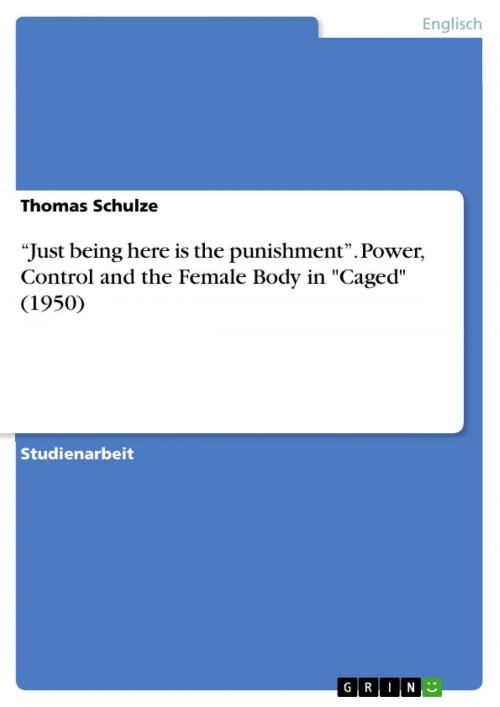'Just being here is the punishment'. Power, Control and the Female Body in 'Caged' (1950)
Nonfiction, Entertainment, Drama, Anthologies| Author: | Thomas Schulze | ISBN: | 9783668193444 |
| Publisher: | GRIN Verlag | Publication: | April 12, 2016 |
| Imprint: | GRIN Verlag | Language: | German |
| Author: | Thomas Schulze |
| ISBN: | 9783668193444 |
| Publisher: | GRIN Verlag |
| Publication: | April 12, 2016 |
| Imprint: | GRIN Verlag |
| Language: | German |
Studienarbeit aus dem Jahr 2015 im Fachbereich Amerikanistik - Sonstiges, Note: 1,3, Humboldt-Universität zu Berlin (Institut für Anglistik und Amerikanistik), Veranstaltung: SE - Teaching American Popular Culture, Sprache: Deutsch, Abstract: In the movie 'Caged', imprisonment is strongly characterized by corporal punishment, surveillance and (bodily) subjection. For that reason, this paper will discuss in which ways and to what extent the female prisoner's body is subjected to disciplinary modes of action and techniques in 'Caged' and how they are related to the exercise of power and control within the punitive apparatus. Based on this thesis, I will discuss three main questions: How does the movie's narrative (re)produce perceptions of female delinquency? In which ways imposes prison coercion upon and control over the female body? How, why and to what extent does the punitive apparatus make 'use' of the female delinquent's body in 'Caged'? In the first part of this paper I will refer to narrative moments, motifs and genre conventions shared by the women-in-prison melodramas, give a short summary of 'Caged' and discuss the cinematic production, representation and reproduction of female delinquency in the film by citing three major and influential readings of 'Caged' within the research discourse. The second chapter will focus on Michel Foucault's concept of delinquency, as part of his cultural-anthropological study 'Discipline and Punish: The Birth of the Prison', refer to dressage and discipline as disciplinary 'techniques' and show how observation, surveillance and control over the female body are put into effect through the disciplinary gaze. Finally, the third part will deal with the way in which prison establishes a grasp on the female body, show how the punitive apparatus thereby creates docile bodies through training of behavior or work and finally conclude by discussing to which extent corporal punishment is used to intensify prison's claims to exercise power and control over the female delinquent's body in 'Caged'.
Studienarbeit aus dem Jahr 2015 im Fachbereich Amerikanistik - Sonstiges, Note: 1,3, Humboldt-Universität zu Berlin (Institut für Anglistik und Amerikanistik), Veranstaltung: SE - Teaching American Popular Culture, Sprache: Deutsch, Abstract: In the movie 'Caged', imprisonment is strongly characterized by corporal punishment, surveillance and (bodily) subjection. For that reason, this paper will discuss in which ways and to what extent the female prisoner's body is subjected to disciplinary modes of action and techniques in 'Caged' and how they are related to the exercise of power and control within the punitive apparatus. Based on this thesis, I will discuss three main questions: How does the movie's narrative (re)produce perceptions of female delinquency? In which ways imposes prison coercion upon and control over the female body? How, why and to what extent does the punitive apparatus make 'use' of the female delinquent's body in 'Caged'? In the first part of this paper I will refer to narrative moments, motifs and genre conventions shared by the women-in-prison melodramas, give a short summary of 'Caged' and discuss the cinematic production, representation and reproduction of female delinquency in the film by citing three major and influential readings of 'Caged' within the research discourse. The second chapter will focus on Michel Foucault's concept of delinquency, as part of his cultural-anthropological study 'Discipline and Punish: The Birth of the Prison', refer to dressage and discipline as disciplinary 'techniques' and show how observation, surveillance and control over the female body are put into effect through the disciplinary gaze. Finally, the third part will deal with the way in which prison establishes a grasp on the female body, show how the punitive apparatus thereby creates docile bodies through training of behavior or work and finally conclude by discussing to which extent corporal punishment is used to intensify prison's claims to exercise power and control over the female delinquent's body in 'Caged'.















